After reciting Tashahhud, Ta‘awwuz and Surah al-Fatihah, His Holiness, Hazrat Mirza Masroor Ahmad (aba) said that tomorrow, the Ahmadiyya Muslim Community in the UK will be holding an event to commemorate 100 years since the foundation stone of the Fazl Mosque was laid. This event will also be attended by non-Ahmadis and neighbours.
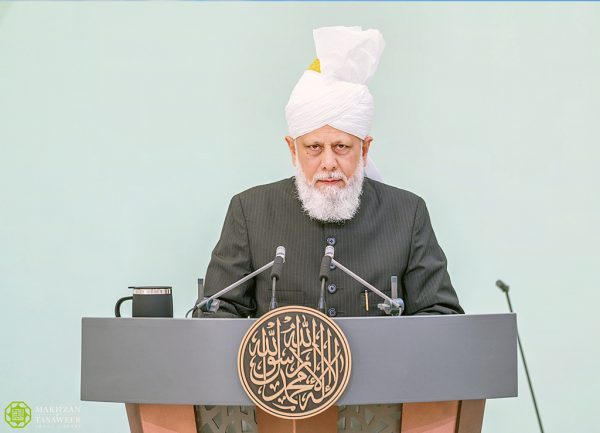
His Holiness (aba) said that the Fazl Mosque is significant because it was the first mosque of the Ahmadiyya Community built in a predominantly Christian nation. The opponents of Ahmadiyyat say that Ahmadiyyat was established by the British; however, it is strange because, in that case, this Community which was supposedly established by them, came to their country and highlighted the weaknesses of their faith and promoted the beautiful teachings of Islam. Those who raise this allegation themselves have not been able to carry out such efforts in propagation.
The First Mosque in the UK
His Holiness (aba) said that before the Fazl Mosque, there was a mosque in Woking which was built by a renowned academic, G.W. Leitner, who used to be the principal of the Oriental College in Lahore. He returned to the UK after retirement and built the mosque in 1889. Interestingly, this was the same year in which Hazrat Mirza Ghulam Ahmad (as) established the Ahmadiyya Muslim Community. G.W. Leitner also established an academic institute beside the mosque as well. The professor passed away in 1899, and there was no one to look after the mosque after him.
His Holiness (aba) said that then in the time of the First Caliph (ra), Khawaja Kamaluddin came to the UK and was successful in reopening the same mosque. He wrote to the First Caliph (ra) saying that he had been put in charge of the trust for this mosque. Chaudhry Zafrulla Khan (ra) also visited and prayed in this mosque.
His Holiness (aba) said that after some time, the Second Caliph (ra) made an appeal for missionaries; however, there was a shortage of funds. Eventually, Hazrat Chaudhry Fateh Muhammad Sial (ra) was sent to the UK, where he worked alongside Khwaja Kamaluddin for some time. After the demise of the First Caliph (ra), Khwaja Kamaluddin did not pledge allegiance to the Second Caliph (ra), so Hazrat Chaudhry Fateh Muhammad Sial (ra) separated himself from Khwaja Kamaluddin.
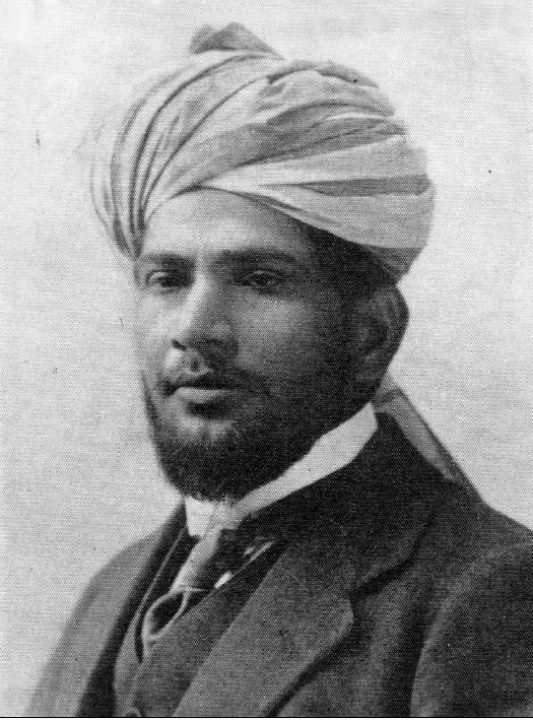
The Distinction and Significance of the Fazl Mosque
His Holiness (aba) said that this was the history of the mosque in Woking. However, the first mosque formally established by the Ahmadiyya Muslim Community was the Fazl Mosque. Today, in London and elsewhere in the world, the Ahmadiyya Community has established many mosques. However, the Fazl Mosque has the distinction of being the first mosque in London.
His Holiness (aba) said that other mosques in London do not spread the true message of Islam, of peace, love and harmony, as is spread from the mosques of the Ahmadiyya Muslim Community. Furthermore, these other non-Ahmadi mosques will be funded by other foreign bodies or governments. However, the Ahmadiyya Community does not receive any foreign funds; instead, these mosques are built as a result of the financial contributions and sacrifices made by Ahmadis. Due to these financial sacrifices, many other mosques have also been built in England and many other western nations.
His Holiness (aba) said that he would speak today about the importance of the Fazl Mosque. The importance of the Fazl Mosque and the benefit of commemorating it with an event will only be beneficial when we understand the purpose and rights of the mosque, the rights of its surroundings, of improving one’s own condition, of increasing in connection with God, and of attaching oneself to the mosque. These are all rights that we must fulfil, and every Ahmadi should remember them. We should not simply become happy by holding a commemorative event; rather, we must fulfil the rights of the mosque and understand its history in contrast with our own condition.
“The Sun Shall Rise From the West”
His Holiness (aba) said that the Promised Messiah (as) said a great deal about the spread of Islam Ahmadiyyat in the West, which serves as the basis for our efforts in propagation. The Promised Messiah (as) said with reference to, “The Sun shall rise from the West” that it was revealed to him that those Western nations which are engulfed by the darkness of disbelief will be enlightened by the light of Islam. The Promised Messiah (as) made another prophecy, in which he said that he saw a vision in which he was standing at a pulpit in London and was delivering a speech in English filled with rational arguments in favour of the truthfulness of Islam. He then saw in a vision that he was catching white birds resembling partridges from small trees. He understood this to mean that his writings would spread to the West and many pure-natured Englishmen would accept Islam.
His Holiness (aba) said that this was the desire and hope of the Promised Messiah (as). In light of this, the Community in London, and indeed around the world, including the West, strives to fulfil this vision of the Promised Messiah (as) through its efforts to propagate the true message of Islam. It was for this very purpose that the Fazl Mosque was established.
His Holiness (aba) said that, as mentioned before, Chaudhry Fateh Muhammad Sial (ra) can be considered the first missionary of the Ahmadiyya Muslim Community, who travelled to the UK, and he also had the honour of bringing the first British convert to Islam Ahmadiyyat, followed by another dozen converts. Chaudhry Fateh Muhammad Sial (ra) would travel around London to various places and deliver lectures.
His Holiness (aba) said that later, Qadhi Abdullah (ra) was sent to the UK and he continued the efforts in propagation, which became increasingly difficult during the First World War. Later, Mufti Muhammad Sadiq (ra) was also sent to the UK, and then Chaudhary Fateh Muhammad Sial (ra) was also sent back to the UK.
Establishment of the Mission House & the Wembley Conference
Under the guidance of the Second Caliph (ra), a property to serve as a mission house was acquired in Putney. When the Second Caliph (ra) was informed of this acquisition, he was in Dalhousie where he held a large function and also named the mosque the Fazl Mosque. He also made an appeal for financial contributions for this property.
His Holiness (aba) said that this piece of land was acquired from a Jewish man. Though it has developed since then, at the time, the land comprised a house and was about an acre in total. Then, in 1924, for the Wembley Conference, it was decided that there should be representation from the various religions of the world so that people may learn about them. Maulvi Abdur Rahim Nayyar (ra) was serving as a missionary in the UK and was invited to deliver a lecture on behalf of the Ahmadiyya Muslim Community. When he sent word to Qadian, the Second Caliph (ra) accepted this proposal and started writing a dissertation in which he highlighted the beautiful and true teachings of Islam for this conference. This has now been published as Ahmadiyyat or The True Islam.
Hazrat Musleh Maud (ra) Arrives in England
His Holiness (aba) said that a consultation was held in which it was suggested that on this auspicious occasion, it would be apt for the Second Caliph (ra) himself to attend the conference. This suggestion was accepted, and after visiting Egypt, Damascus, Switzerland and France, the Second Caliph (ra) made his way to England on 22 August 1924. Interestingly, the Second Caliph (ra) had seen a vision prior to his arrival in which he saw that he was stepping onto the shores of England like a victorious general and heard a voice saying, ‘William the Conqueror.’
His Holiness (aba) said that newspapers covered the arrival of the Second Caliph (ra) in England quite extensively. The Second Caliph (ra) and those who travelled with him visited St Paul’s Cathedral, outside of which he prayed for Islam’s victory, after which he entered the city. During the course of the Second Caliph’s (ra) stay in London, word about the Ahmadiyya Community spread a great deal.
His Holiness (aba) said that after attending the various functions, it came time to lay the foundation stone of the Fazl Mosque. The Second Caliph (ra) had decided that rather than renting various homes as mission houses which naturally would impact the efforts of propagation, a central headquarters should be established. Until 1919, due to a lack of funds and land, this task seemed too difficult. However, God furnished the required means. First came the funds; after the war, the value of the British Pound dropped. When this happened, the Second Caliph (ra) thought to take advantage. On 6 January 1920, he instructed that 14 to 15 thousand rupees should be sent to England. Later, when putting this instruction into writing, the Second Caliph (ra) wrote 30,000 rupees instead, and rather than sending it as a loan, he wrote that it would be sent as a financial contribution. Initially, on the first day, 6,000 rupees were collected. By 11 January, the Ahmadiyya Community in Qadian made great sacrifices and collected 12,000 rupees. Then, an appeal was also made outside of Qadian and in order to give people more opportunities for sacrifices, the amount was increased to 100,000 rupees. Then, through the Bank of India, this amount was sent to England.
Laying of the Foundation Stone & Address of Hazrat Musleh Maud (ra)
His Holiness (aba) said that on 19 October 1924, the Second Caliph (ra) laid the foundation stone of the Fazl Mosque. It was raining on that day, and when this was brought to the attention of the Second Caliph (ra), who said that it was no matter, for those who still came to the event would do so out of sincerity and the event would be successful. A small marquee was erected for the event. Invitations were sent out to various people including politicians, dignitaries and diplomats. Despite the short notice, many guests attended the event.
His Holiness (aba) said that the Second Caliph (ra) delivered an address on this occasion, highlighting the importance and significance of the moment. He drew attention to the fact that all of this was being done to build a structure where people could gather and unite in the worship of the Creator of the entire universe, no matter their status, race or any other apparent difference. He drew attention to the fact that there are always disputes between people in the world. He said that disputes in themselves are not wrong, rather what is wrong is a lack of forbearance and remaining stubborn. The Second Caliph (ra) said that disputes should not create disunity. He said that people say disputes are bad, but what meaning would forbearance have if there were no disputes? It is in the face of disputes and differences of opinion that forbearance comes to light. Despite having differences of opinion, people should still be able to live together harmoniously. People’s views cannot and should be changed by force; rather, the focus should be on changing their hearts.
His Holiness (aba) said that the Second Caliph (ra) highlighted that a mosque does not belong to any person; rather, it belongs to God. He quoted the following Qur’anic verse:
‘And who is more unjust than he who prohibits the name of Allah being glorified in Allah’s temples’ (The Holy Qur’an, 2:115)
His Holiness (aba) continued quoting the Second Caliph’s (ra) address in which he cited an incident from the life of the Holy Prophet (sa). A group of Christians from Yemen visited the Holy Prophet (sa), and during their visit, it came time for their prayer. They sought permission to go outside and offer their prayer; however, the Holy Prophet (sa) said that the Qur’an says that a mosque is open to anyone who worships God and told them that they could offer their prayer within the mosque. The Second Caliph (ra) said that it was with the same spirit that the Ahmadiyya Muslim Community was establishing this mosque. The purpose of the mosque is solely to worship God, and no one who wishes to worship God will be stopped from entering the mosque. The Second Caliph (ra) expressed his hope that this mosque would serve as a beacon for ending discord in the world, establishing unity and fostering a mutual spirit of collective progress.
100 years Later
His Holiness (aba) said that 100 years on, we have witnessed many people from varying backgrounds and places say that everyone becomes united upon visiting any platform of the Ahmadiyya Muslim Community. On the occasion of the laying of the foundation stone, the Second Caliph (ra) also unveiled a commemorative plaque which reads:
‘IN THE NAME OF ALLAH THE MOST BENEFICENT AND THE MOST COMPASSIONATE. WE PRAISE AND INVOKE HIS BLESSING ON HIS PROPHET THE EXALTED ONE. WITH THE GRACE AND MERCY OF GOD, HE ALONE IS THE HELPER.
Verily, my prayer, my sacrifice, my life and my death are for Allah the lord of all the worlds. I, Mirza Bashiruddin Mahmud Ahmad Khalifatul Masih, Head of the Ahmadiyya Community, which has its Headquarters at Qadian, Punjab, India lay the foundation stone of this Mosque today, the 20th Rabiul Awwal 1343 Hijra, to seek the pleasure of God so that His name be glorified in England and the people of this country may also partake of the blessings which have been vouchsafed to us. I pray to God that He may accept this humble and sincere effort of all the members of the Ahmadiyya Community, both women and men, and that He may provide means for the growing prosperity of this Mosque and may He make it for ever and ever a centre for promulgating the views of purity, piety, justice and love, and may this place prove a sun of spiritual light radiating forth in this country and in all the countries around the blessed beams of the Heavenly light of the Holy Prophet Muhammad, the Chosen one of God and the Seal of the prophets, and of Ahmad the Promised Messiah, the prophet of God the Vicegerent and the reflection of Muhammad (may peace and the blessings of God be upon them both). Amen
19-10-1924’
His Holiness (aba) said that this event was widely covered by newspapers and various quotes of the Second Caliph’s (ra) speech were also quoted. After two years, in 1926 the Fazl Mosque was inaugurated by Sheikh Abdul Qadir.
His Holiness (aba) said that this was a brief history of the Fazl Mosque. As we commemorate 100 years, the event being held is not for any worldly purpose. Rather, as outlined by the Promised Messiah (as) and the Second Caliph (ra), this mosque is a place where people may gather to remember and worship God and focus on fulfilling each other’s rights and reforming themselves spiritually while increasing their moral standards. In today’s time, when people are moving away from religion, mosques hold more significance than ever before. Hence, we must draw the attention of our future generations towards the fact that our survival lies in worshipping God, fulfilling His commandments and serving His creation. Every Ahmadi should remember this purpose. The Holy Prophet (sa) said to like for others what you like for yourself. Therefore, we must spread Islam’s message of peace, love and harmony to the entire world. This alone is the path to humanity’s salvation, otherwise, future generations will be destroyed by the wars and disorders of this world.
His Holiness (aba) prayed that may Allah the Almighty enable everyone to fulfil the due rights of this mosque and indeed every mosque. May we do justice to spreading God’s word to the world, and may we become true Muslims, the purpose for which God commissioned the Holy Prophet (sa). Then, in this era, He sent the Promised Messiah (as) for the revival of Islam, to spread the unity of God throughout the world and to bring the world under the banner of the Holy Prophet (sa). May Allah enable us all to do so.
Summary prepared by The Review of Religions

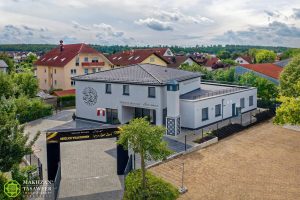
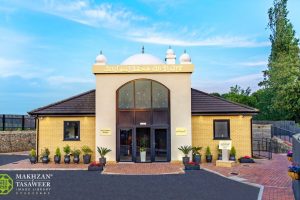
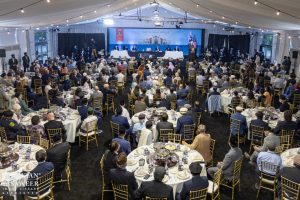
Add Comment